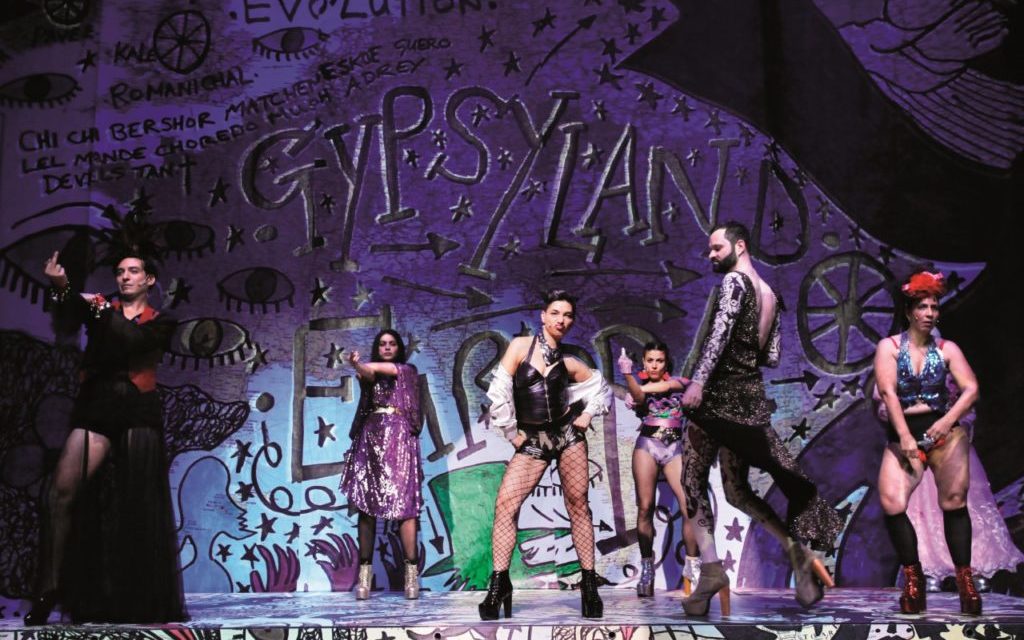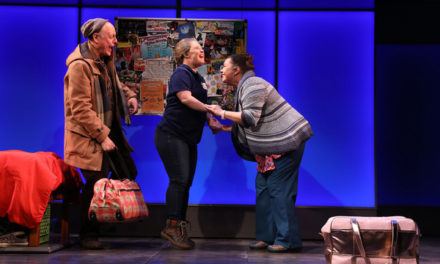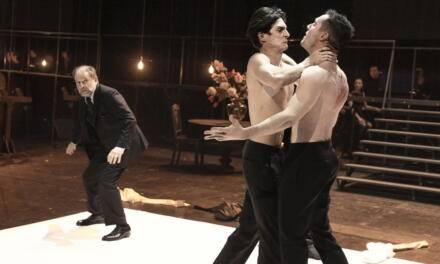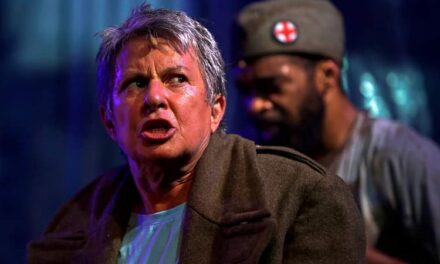Doing It Right!
Yael Ronen, an Israeli theatre director working for the Maxim Gorki Theater in Berlin, has a reputation of one of the most socially, culturally, and politically aware theatre artist of Europe. The Gorki’s latest creation–Roma Armee that premiered in Berlin in September 2017–is a proof in point. Devised by the international team of eight performers, all ethnic Roma, this production speaks directly to the most dangerous tendencies in the post-Brexit Europe: such as rising nationalism, xenophobia, and racism.
With Ronan’s earlier productions Third Generation that featured German, Israeli and Palestinian actors and The Situation that looked into the political situation in the Middle East and commented on the life of migrants in Germany, the politically urgent topics are not new to Ronen’s work. This time, however, the company’s focus was the Roma people and the history of their persecution.
Created at the crossroads of political cabaret and testimonial theatre, Roma Armee sketches a heartbreaking picture of historical and recent injustice against the gypsy people of Europe; and so, not surprisingly, it rubs some spectators in a wrong way. The prejudice to the gypsy population bears a long history in the European collective consciousness; Jews would be the other ethnic group to endure a similar hatred. Ronen uses wide theatrical strokes to sketch this dark history. The production features personal testimonies of the performers, historical dramatizations, and Brechtian songs. However, victimhood is not the position that Ronen and her team would ever embrace. On stage, we see the beginnings of the revolution. The Roma people of the falling apart European Union are called to stand united against the collective danger of rising neo-Nazism. The eight performers represent everything we associate with democracy. They are diverse, queer, artistic and politically conscious. They are also eternal travelers, coming to Berlin from Austria, Serbia, Germany, Kosovo, Romania, England, and Sweden.
In its themes and devices, Roma Armee reminds of many other productions in the so-called identity or immigrant theatre repertoire. On stage, we hear stories of personal ostracism and childhood abuse, we learn the truth about Roma peoples’ imprisonment and sterilization, violation of human rights, scapegoat practices, and witch hunting, as they took place as recently as in 2003, UK. For an audience member, like myself, who has been repeatedly exposed to the theatre work about identity, migration and related to its politics, the energy of Roma Armee seemed to be somewhat belligerent, especially in its rather militaristic desire to set things right, to keep memory alive, and to tell the true story. So, when Orit Nahmias (an Israeli actor working in the Gorki Teatr) and Mehmet Ateşçi (a Turkish-born German performer) came on stage to tell the audience why a scene from Bizet’s Carmen played by a Jew and a Turk would not be appropriate in the project about Roma people, their dialogue became a welcome comic relief. Of course, using another set of European Others–a Jew and a Turk–as comic fools can appear problematic, but not in Ronen’s hands. Not only is she able to recognize a stereotype and make fun of it, she is also not afraid of providing critical commentary on the dangers of commercializing the narratives of the victimhood. Commenting on his status as a supporting character in Roma Armee, Ateşçi explains that when he was invited into this project he plunged into his own family’s history, looking for the stories of oppression and seeking the emotions of anger and frustration to bring on stage. Now, although only in the supporting role, he is still happy to be a part of this revolution. Using this self-satirical commentary, Ronen allows humor into the pathos. As a “privileged” European artist, who runs a state-sponsored cultural institution, Ronan invites the Roma people on the German theatre stage and thus sets up an example of artistic courage and personal responsibility. She places Roma Armee within the tradition of the European agitprop theatre and Brechtian political cabaret.
Idea by Sandra Selimović and Simonida Selimović
Devised by Yael Ronen and Ensemble: Mehmet Ateşçi, Hamze Bytyci, Mihaela Dragan, Riah May Knight, Lindy Larsson, Orit Nahmias, Sandra Selimović, Simonida Selimović
Directed by Yael Ronen, the winner of XIV Europe Prize Theatrical Realities, 2017
Set Design by Heike Schuppelius
Artwork by Damian Le Bas and Delaine Le Bas
Costume by Maria Abreu and Delaine Le Bas
Music by Yaniv Fridel and Ofer Shabi
Video by Hanna Slak and LUKA UMEK
Lighting by Hans Fründt
Dramaturgie by Irina Szodruch
In German, English and Romanian
Roma Armee was presented on December 16, 2017, in Teatro Argentina, Rome, as part of XVI Europe Theatre Prize–XIV Europe Prize Theatrical Realities; December 12th–17th, 2017
This post originally appeared on Capital Critic’s Circle on December 20, 2017, and has been reposted with permission.
This post was written by the author in their personal capacity.The opinions expressed in this article are the author’s own and do not reflect the view of The Theatre Times, their staff or collaborators.
This post was written by Yana Meerzon.
The views expressed here belong to the author and do not necessarily reflect our views and opinions.


















